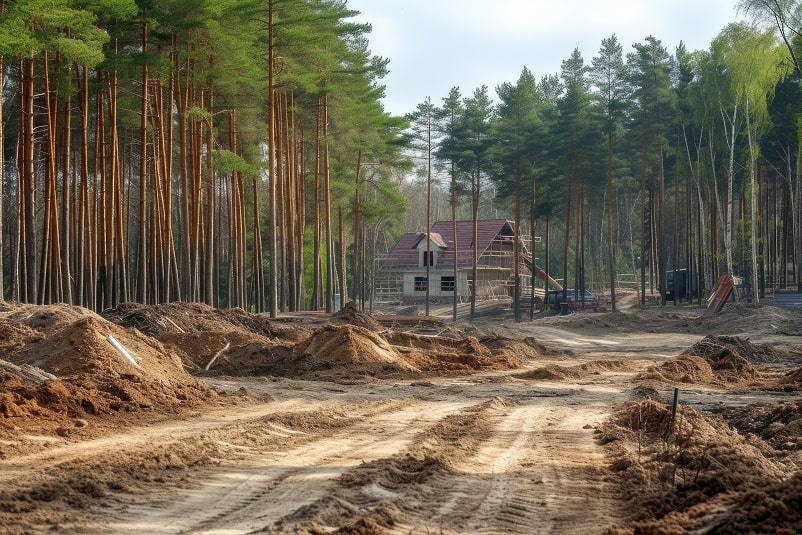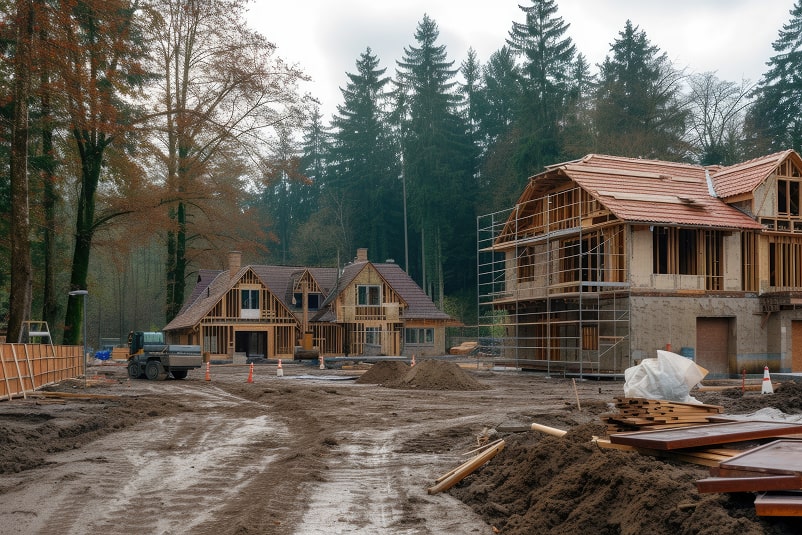Introduction to Land Mortgages
Land mortgages are a type of secured loan used to purchase land whether for residential self-build projects, agricultural use, commercial development, or land banking. Unlike traditional residential mortgages, land mortgages differ from traditional mortgages in that they are designed for land or land related properties and often require specialised lenders and criteria due to their unique risks. As a result, lenders apply stricter criteria and offer slightly different terms.
Land mortgages typically involve a higher deposit, often around 30% to 50%, and may have shorter repayment terms, particularly if the land is being held for development. These loans often come with a higher rate or interest rate compared to traditional mortgages, reflecting the increased risk to the lender. In cases where planning permission is in place, lenders are often more flexible and may offer better terms.
Depending on your circumstances and land type, you could get a mortgage for land through a high street bank, specialist lender, or agricultural finance provider. The lender will assess the land’s current and potential value, your intended use including land use such as agricultural, residential, or commercial and your personal financial profile. Land use plays a significant role in lender decisions, as it affects eligibility, perceived risk, and specific loan terms.
Understanding how land mortgage work is important, as the process is more complex than for traditional mortgages and often involves specialised lenders and additional documentation.
Who Would Benefit from a Land Mortgage?
Land mortgages are ideal for a range of individuals and businesses:
Self-builders purchasing land to construct their own homes
Property developers buying plots for future residential or commercial projects
Farmers and agricultural investors looking to expand operations
Investors purchasing land for land banking or future capital growth
Businesses seeking land for warehouses, offices, or retail development
People looking to buy land for various purposes can benefit from land mortgages, which offer specialised financing options tailored to different needs.
The key is understanding the type of land you’re purchasing, whether it’s with or without planning permission, greenfield or brownfield, or agricultural vs. commercial as these will significantly affect both lender appetite and mortgage terms.
Estate agents can assist buyers in finding suitable land and navigating the purchase process, using their expertise and specialied search tools.
Land mortgages can also be a strategic tool for those considering land as a future investment.
Land Mortgage Options for Prospective Clients
When financing land, different mortgage products are available depending on your intended use and the type of land. The intended purpose of the land such as whether it will be used for development, woodland, or another specific use directly influences which mortgage options are available and how lenders assess your application.
Here’s a breakdown of common options:
Residential Land Mortgage (With Planning Permission)
Ideal for self-builders or developers, especially those looking to build their own home on the land. Lenders are more likely to offer favourable terms when full planning permission is granted. You may also be able to transition into a self-build mortgage once construction begins.
Land Mortgage Without Planning Permission
Much harder to secure, as the land has no confirmed future use. Lenders may offer lower loan-to-value (LTV) ratios often 40% to 50% and may require a detailed proposal or planning strategy, with approval and specific terms subject to individual application and lender criteria.
Agricultural Land Mortgage
Designed specifically for farmers or rural businesses. These mortgages may come with tax advantages and long-term repayment options, but usually require strong business plans and financials. Proof of income is often required for agricultural land mortgages, as lenders assess your income to determine affordability and repayment capacity.
Commercial Land Mortgage
For businesses buying land for warehousing, office space, or retail development, a commercial mortgage is often used to finance these purchases. These are typically available through specialist commercial lenders and may include flexible repayment structures or interest-only options.
Bridging Finance for Land Purchase
A short-term option if you need to act quickly, such as at auction, or to complete a sale quickly. Bridging loans can be arranged rapidly but come with higher interest rates. Many borrowers refinance with a full land mortgage after purchase.
Lenders Offering Land Mortgages
Here’s a comparison of lenders that offer mortgages and finance for land purchases. Most mortgages are not designed for land, and most lenders do not offer these products, so specialist providers are usually required:
Lender | Loan Size & LTV | Type of Land | Key Features |
|---|---|---|---|
Agricultural Mortgage Corp (AMC) | £100k+ / Up to 70% | Agricultural and rural land | Long-term fixed rates, flexible terms |
Shawbrook Bank | £150k+ / Up to 65% | Commercial and residential development | Tailored underwriting, planning permission helpful |
Paragon Bank | £250k+ / Up to 60% | Residential land with planning | Supports phased development funding |
Ecology Building Society | £100k+ / Up to 80% | Self-build & eco land plots | Ideal for sustainable projects |
Together Money | £50k+ / Up to 60% | Land with or without planning | Bridging and term finance options available |
Assetz Capital | £200k+ / Up to 70% | Development or commercial land | Flexible drawdown for staged projects |
Note: Loan amounts, LTVs, and interest rates vary by lender, land type, and borrower profile. Woodland mortgages are a specialised product offered by only a few lenders, and availability depends on the intended use of the land.
The Land Mortgage Application Process
Securing a land mortgage is a more involved process than applying for a standard residential mortgage, and it requires careful planning and attention to detail. Whether you’re looking to purchase agricultural land, a plot for a self build project, or land for commercial purposes, understanding the application process is key to a successful outcome.
Step 1: Define Your Intended Use and Mortgage Type
Before you begin your mortgage application, it’s essential to clarify the intended use of the land whether for agricultural, commercial, or self build purposes. This will help you identify the most suitable mortgage types and lenders.
For example, agricultural mortgages are designed specifically for buying farmland, while commercial mortgages are tailored for business developments. Specialist lenders and private banks often offer land mortgages with more flexible terms than high street banks, especially for unique or complex projects.
Step 2: Meet Eligibility Criteria and Prepare Your Finances
Lenders will assess your eligibility based on several factors, including your credit history, financial situation, and the loan to value ratio (LTV) of your proposed purchase. Most land based mortgages require a substantial deposit, typically at least 30% of the purchase price, though some lenders may require more depending on the risk profile.
A strong business plan and clear financial projections are especially important if you’re seeking finance for agricultural land or commercial purposes, as lenders want to see how you plan to use the land and repay the loan.
Benefits and Drawbacks of Using a Land Mortgage
Key Benefits
One of the biggest advantages of using a land mortgage is the ability to acquire land you may not otherwise be able to afford outright. Whether you’re a self-builder looking for the perfect location or a developer investing in future growth, financing provides immediate access to opportunity.
Access to larger plots with less upfront capital
Unlocks self-build and development potential
Tax-efficient finance for agricultural buyers
Can be used to secure planning permission and increase the land’s value
Option to refinance into construction or commercial mortgages later
Key Costs and Considerations
Higher deposit requirements, often 30%–50%, which you will need to pay upfront
Stricter lender criteria for land without planning permission
Valuation and legal fees you must pay can be more complex than for a standard mortgage
Shorter loan terms for certain land types (e.g., land banking or without planning)
Interest rates tend to be higher than residential mortgages, typically between 5%–10% depending on the risk profile, and you will pay these rates throughout the loan term
It’s essential to work with an experienced broker to compare terms, understand lender requirements, and structure the loan in line with your end goal whether that’s development, resale, or long-term holding.
Is a Land Mortgage Right for You?
A land mortgage can be a powerful tool if you’re looking to purchase land for future development, farming, residential property, or self-build purposes. With options tailored to residential, agricultural, and commercial land uses, there’s a wide variety of lenders ready to finance your vision. Working with a broker can help you compare offers and secure the best deal for your needs.
However, given the complexity of land lending, it’s crucial to do your homework. It’s worth noting that land mortgages often come with higher interest rates and stricter lending criteria than other types of loans.
These loans are more complex and specialised compared to standard residential mortgages, so requirements and terms can differ significantly. Ensure you understand the planning status of the land, assess your exit strategy, and build a clear financial case for your project.
Land that has already been purchased with planning permission can offer more financing options and potentially better terms. The right lender and mortgage structure can save you time, money, and stress.
Get help from an experienced mortgage broker.
You can speak to one of our specialist mortgage brokers who would be able to guide you through the process. They will advise if there is a lender available and the maximum loan amount based on your circumstances. We are a whole of market mortgage brokerage with access to all lenders. Call us on 01332 470400 or complete the form with your details for us to give you a call back.
Why Work with Option Finance for Commercial Mortgages?
At Option Finance, we specialise in mortgages for complex credit scenarios. Our team works with all major bad credit lenders and has access to exclusive deals that aren’t available on the high street.
Understanding one’s credit report from a credit reference agency can help in securing a mortgage.
Over 20 years of experience
Full market access to specialist lenders
Fast, honest, and personalised mortgage advice
Expert help with complex or recent credit issues
Showing our favourite reviews

Always attentive, helpful and efficient
Jonathan, 27 Jan 2025

Best Mortgage Broker in the UK!
Liam, 26 Nov 2024

Ben was really helpful in helping me…
George, 28 Aug 2024
FAQs
What is a land mortgage?
A land mortgage is a type of loan used to purchase a plot of land, either for investment, self-build projects, or future development.
Can I get a mortgage for land without planning permission?
Yes, but it’s more challenging. Lenders typically prefer land with planning permission, as it’s considered lower risk. Land without permission may require a larger deposit and higher interest rates.
How much deposit do I need for a land mortgage?
Most lenders require a deposit of at least 30% to 50% of the land’s value. The exact amount depends on factors like planning permission, land location, and intended use.
What are the main types of land mortgages?
Common types include residential land mortgages (for self-build homes), agricultural land mortgages, and commercial land finance. The type you need depends on how the land will be used.
Can I get a land mortgage if I plan to build a home?
Yes. Many lenders offer self-build mortgages, which are designed for people who plan to construct a home on the purchased land. These loans are usually released in stages as the build progresses.
Ready to Take the First Step?
Whether you’re a first-time buyer, remortgaging, or moving home, bad credit doesn’t have to hold you back.
Understanding credit scoring can help you prepare for a mortgage application. You can speak to one of our specialist mortgage brokers who would be able to guide you through the process. They will advise if there is a lender available and the maximum loan amount based on your circumstances. We are a whole of market mortgage brokerage with access to all lenders.
































